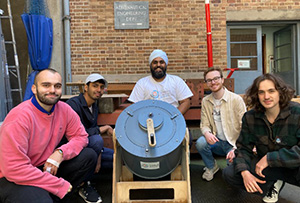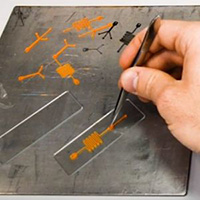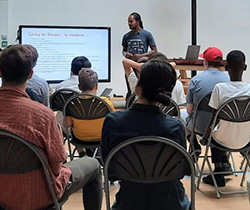Improving lives through engineering
This National Engineering Day, we’re celebrating staff and students at the University of Bristol who are improving lives through engineering.
Improving lives by… developing socks to help those living with dementia
 Dr Zeke Steer invented smart socks that track heart rate, sweat levels and motion to give carers insights into the wearer’s wellbeing and anxiety levels via an app.
Dr Zeke Steer invented smart socks that track heart rate, sweat levels and motion to give carers insights into the wearer’s wellbeing and anxiety levels via an app.
Dr Steer’s work is inspired by his great-grandmother Kath, who became increasingly anxious and aggressive due to her dementia. The socks have also been used by people with autism spectrum disorders and some learning disabilities.
After leaving his job as a software engineer in the defence industry to take up a PhD at Bristol Robotics Laboratory, Dr Steer volunteered at a dementia care home to investigate how wearable technologies and artificial intelligence could help with distressed behaviours.
With support from the University’s incubator for tech businesses and the Alzheimer’s Society, Dr Steer’s company, Milbotix, is now testing the socks among those living with mid- to late-stage dementia and developing the tech further before bringing the product to market next year.
Read more about Dr Steer’s smart socks
Improving lives by… designing hand-spun washing machines
 Engineering Design students are working with non-profit organisation ‘The Washing Machine Project’ and local engineering firm Huxlo to refine a hand-spun washing machine that could change the lives of millions of people around the world.
Engineering Design students are working with non-profit organisation ‘The Washing Machine Project’ and local engineering firm Huxlo to refine a hand-spun washing machine that could change the lives of millions of people around the world.
While on sabbatical in India, Navjot Sawhney from The Washing Machine Project struck up a friendship with a local woman, Divya, and noticed how much time was spent on the exhausting task of hand-washing clothes. Now, six years later, Navjot is working with our Engineering Design students to bring the machine up to the best possible spec.
Each student is working on one part of the washing machine: from improving the manufacturing process to making its materials more sustainable.
Read more about The Washing Machine Project
Improving lives by… helping the world cut its carbon footprint
 Engineers have a key role to play in the future of our planet. We’re incredibly proud of researchers like Valeska Ting and her team who are exploring ways to make hydrogen a feasible fuel source for aviation and Ben King Sutton Woods, who is revolutionising the design of helicopters to minimise emissions.
Engineers have a key role to play in the future of our planet. We’re incredibly proud of researchers like Valeska Ting and her team who are exploring ways to make hydrogen a feasible fuel source for aviation and Ben King Sutton Woods, who is revolutionising the design of helicopters to minimise emissions.
Graduates like Zoe Goss are also using their engineering knowledge and problem-solving skills to tackle climate change.
Read more about Zoe’s journey.
Improving lives by… helping older people live more independently using robotics
Thanks to the latest developments in robotics, new opportunities are opening up for older people, helping them to lead more comfortable, active and independent lives.
- Professor of Robotics Jonathan Rossiter’s emPOWER project is exploring how robotic muscles can be implanted in the body to replace or work alongside our own muscles to transform treatment options and help us live longer.
- Professor Rossiter is also leading a team working on assistive clothing or ‘wearable muscles’ to support people suffering from age-related muscle degeneration.
- Professor Anne Roudaut is leading research into robotics which can help with the rehabilitation of patients after a stroke. ‘Mantis’ is the first system of its kind that enables light, affordable and accessible haptic force feedback which, in a therapy setting, stimulates the sensation of touch.
- Dr Sabine Hauert and co-investigator Ana Rubio Denniss have developed a prototype device to help drive wound healing and reduce infection on a cellular level.
- The SPHERE team have been working on wearable and environmental sensors to help people live more independently for over 10 years now. By building up a picture of how we live at home, this information can be used to spot issues that indicate a medical or wellbeing problem and deliver better healthcare outcomes in the future.
Read more about robotics for healthcare.
Improving lives by… revolutionising access to medical diagnostic devices
 Microfluidic devices, used in ‘lab-on-a-chip’ technologies, can provide a rapid medical diagnosis at the point of care, however prototyping can be a costly exercise.
Microfluidic devices, used in ‘lab-on-a-chip’ technologies, can provide a rapid medical diagnosis at the point of care, however prototyping can be a costly exercise.
Dr Robert Hughes, Harry Felton and Andrea Diaz-Gaxiola have developed a novel technique that has the potential to accelerate the trial and development process of these diagnostic techniques at minimal cost, thereby allowing their easy implementation in parts of the world where fast diagnoses are desperately needed to improve public health and mortality.
Read more about microfluidic devices.
Improving lives by… encouraging the next generation of engineers
 The world needs more engineers and we’re passionate about giving school-aged children opportunities to explore this fascinating discipline.
The world needs more engineers and we’re passionate about giving school-aged children opportunities to explore this fascinating discipline.
Our staff and students regularly visit schools and take part in activities to introduce children and young people to engineering.
Earlier this year, pupils at Venturers’ Academy, the first state-funded school for students on the autistic spectrum to open in Bristol, worked with our student ambassadors to code the most efficient bat hunter and design adaptive technology that skateboarders might use in the next Paralympic Games.
Can you build an 8-bit computer in Minecraft? Or construct the longest overhanging arch to reach out over the sea? Put your knowledge and skills to the text by exploring our range of resources and activities available online.
Further information
Engineering at Bristol: www.bristol.ac.uk/engineering
National Engineering Day from the Royal Academy of Engineering: raeng.org.uk


